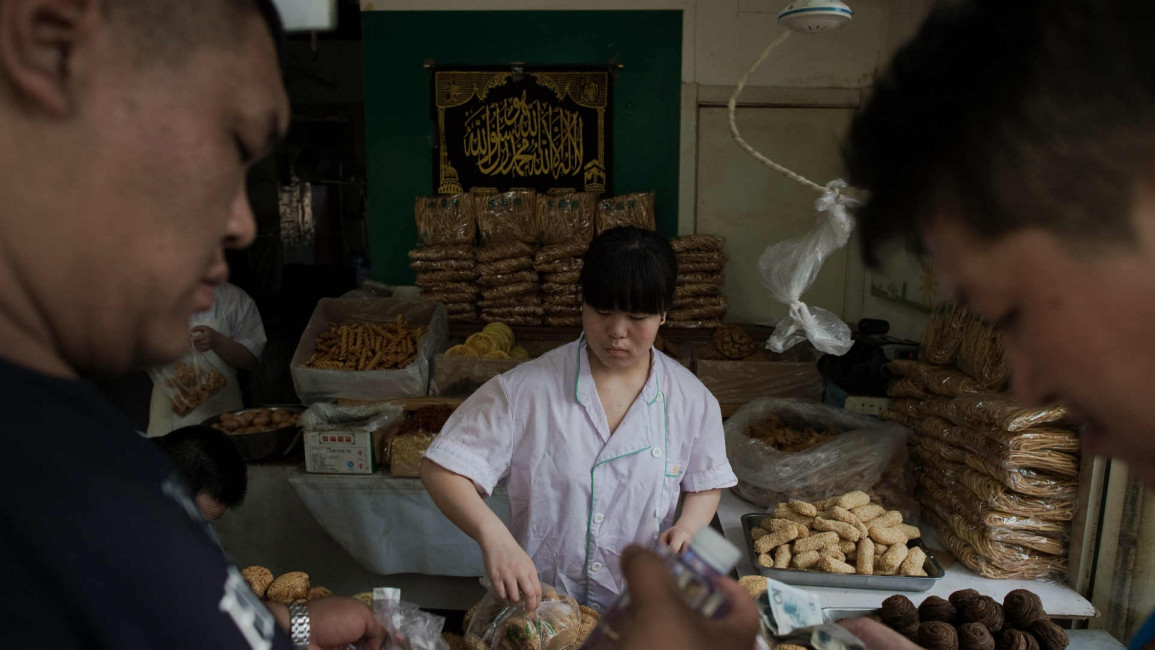China orders Beijing restaurants to 'tear down' Arabic, Islamic, Halal signs
China has ordered restaurants in the capital Beijing to tear down Arabic signs and Islamic symbols as part of a national effort to "Sinicise" the country's Muslim population, agencies have reported.
Officials also claimed that a majority of the 1.5 million detainees held in so-called "re-education camps" in the northwestern Xinjiang region of China have been released.
The US, human rights organisations and Uighur Muslims have thrown doubt on those claims.
Employees at Beijing restaurants and food stalls selling halal products told Reuters that government officials had told them to remove symbols associated with Islam from their signs.
Read more:
China pressures Uighurs to marry non-Muslims in bid to 'erase their culture'
The manager of a Beijing noodle shop was visited by government officials who told him to cover up the word "halal" on his shop sign, and then watched him do so.
"They said this is foreign culture and you should use more Chinese culture," he said.
Islam - and the Arabic language - first came to China in the seventh century.
The Chinese capital has at least 1,000 halal shops and restaurants, according to the Meituan Dianping food delivery app.
It is not clear if all such restaurants have been told to cover or remove their signs.
Several shops visited by Reuters had removed Arabic-language "halal" signs and replaced them with a Chinese equivalent term, while others had covered the word and other Islamic imagery with tape or stickers.
The Beijing government's Committee on Ethnic and Religious affairs said that the order was a national directive, although the committee's national branch did not respond to a request for comment.
Anti-Muslim campaign
The campaign to remove Arabic signage and other symbols associated with Islam marks a new phase in an ongoing campaign to pressure China's 20 million-strong Muslim population, particularly with Uighur Muslims of the Xinjiang province, to conform to Chinese culture.
The campaign has seen the demolition of mosques, as well as the removal of the domes of mosques and their replacement with Chinese-style pagodas, the installation of unprecedented, high-tech surveillance measures, limits on fasting during the Muslim holy month of Ramadan, and bans on wearing Islamic facial coverings and lengthy beards.
While China officially guarantees freedom of religion, the government has sought to crackdown on religious expression and bring faith communities in line with Communist Party doctrine.
Underground churches have also been shut down by the government.
But Chinese Muslims have drawn particular ire from the state.
China has detained an estimated 1.5 million Muslims - mostly from the Uighur ethnicity - in "re-education camps" that have been labelled concentration camps by human rights organisations and advocates.
The state says those efforts are necessary to counter the threat of seperatist and Islamist extremist in the region.
But Uighur Muslims and human rights organisations say that Muslims in Xinjiang are subject to intense surveillance and scrutiny, with hundreds of thousands of people detained for little reason other than to quash the expression of religious and ethnic differences.
Detainees freed?
|
|
Chinese officials said on Tuesday that most people detained in Xinjiang's "re-education camps" had been "returned to society".
Alken Tuniaz, vice chairman of the Xinjiang government, said that "over 90 percent of the students" had completed their "training" and had returned to their families.
"Most have already successfully achieved employment," he said.
Experts and advocates have thrown doubt on the claim, saying there was no evidence of mass-scale releases of detainees.
"China is making deceptive and unverifiable statements in a vain attempt to allay worldwide concern for the mass detentions of Uyghurs and members of other ethnic minorities in Xinjiang," Nicholas Bequelin, Amnesty International's Regional Director for East and South-East Asia, said in a statement.
"We have received no reports about large scale releases - in fact, families and friends of people who are being detained tell us they are still not able to contact them."
The US State Department and Pentagon likewise said they had been "unable to verify the vague claims" in a joint statement.
That same scepticism was repeated by the World Uyghur Congress, a Germany-based group that campaigns for Uighur self-determination, which said the claim followed "a predictable pattern of dubious statements".
The State Department and Pentagon also urged China to allow UN officials unfettered access to the camps, and allow Muslims to travel freely out of Xinjiang and China.
Read also:



